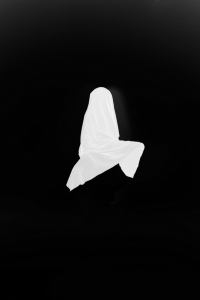
“Fallen” by Nicholas Rex
By Abby Knudsen
Within an hour after slipping off the little cliffside, she accepted that she would die there, among the juniper trees and sagebrush and sand. While she lay there on the rocks at the bottom, unable to stand, she grazed her fingertips over the familiar place where her left ribs should be. A few ribs protruded under the skin, unfamiliar, and every time she allowed air into her lungs, the left side protested violently. In exchange for air, she set her chest on fire. She tried to call for help but couldn’t breathe enough air to yell louder than speaking volume. She couldn’t stand, either—her left leg faced the wrong way, and her calf was torn open by bone.
It had been a mistake to go off the trail and think she could find the waterfall by tracking the sound. She realized now that it had been an echo, probably from nowhere nearby. She had been careless to wander and careless to lose her footing in a place with no cell reception.
So, with only her arms, she had crawled in the direction she believed the trail to be, leaving a stream of blood behind herself, until she could no longer continue from the pressure on her punctured lung. And as she had crawled, with thoughts circling of her parents and sister and of food and water, she couldn’t help but remember her favorite poem—the one that says, “You do not have to walk on your knees / for a hundred miles through the desert repenting.”
If only, she thought. If only it was that easy, to walk on knees rather than crawl with arms.
But she could still repent, she knew. If not for punishment, why else would she have been put here? She stopped crawling, rested her head on her backpack, and spoke her guilt from the bed of sandstone and sticks, rather than the traditional deathbed she’d always imagined. I’m sorry for not going to church, she said. I’m sorry for telling Amy I loved her, even when I didn’t. I know—I should have gone to Mom’s funeral and helped Dad with the house. I’m sorry. What else do you want to hear?
And then she called for help again with her lung splitting open, even though she could barely whisper. There had to be someone—maybe someone else who had wandered far from the trail, looking for the waterfall too. But the amount of air she could breathe lessened, lessened as her lung depleted, and she could do nothing but lie there and repent. The sun fell behind the mountain, and she watched it from her sideways view, wishing she could reach out to hold it in her hands and stop it.
She kept her eyes to the sky, looking instead for the wild geese that Mary Oliver said would be there, high in the clean blue air. But they didn’t bother to show. Only the vultures circled—just a few at first, then a whole flock, pacing in a circle in the air.
With such little oxygen flowing through her body, her mind was lightheaded and her vision began to blur. In a way, the vultures almost looked like geese—geese, if they were circling around to come and save her, to scoop her up and fly her home.
She closed her eyes and let the world go on.
The vultures were kind enough to delay their approach until after she had taken her last shallow breath. Then, as one, they stooped around her and tore away at her body, grateful for their fortune. They peeled away her skin first, hardly savoring it in order to devour the fresh flesh still warm inside her. The vultures’ beaks and chests stained red, and blood pooled on the sandstone. Then they flew away, satisfied.
They left behind her shredded bits of clothing, along with her skeleton—the only parts of her that the rescuers would find. And when she could not tell her own story, the broken bones would.
Abby Knudsen is a senior at BYU majoring in editing and publishing and minoring in creative writing.


